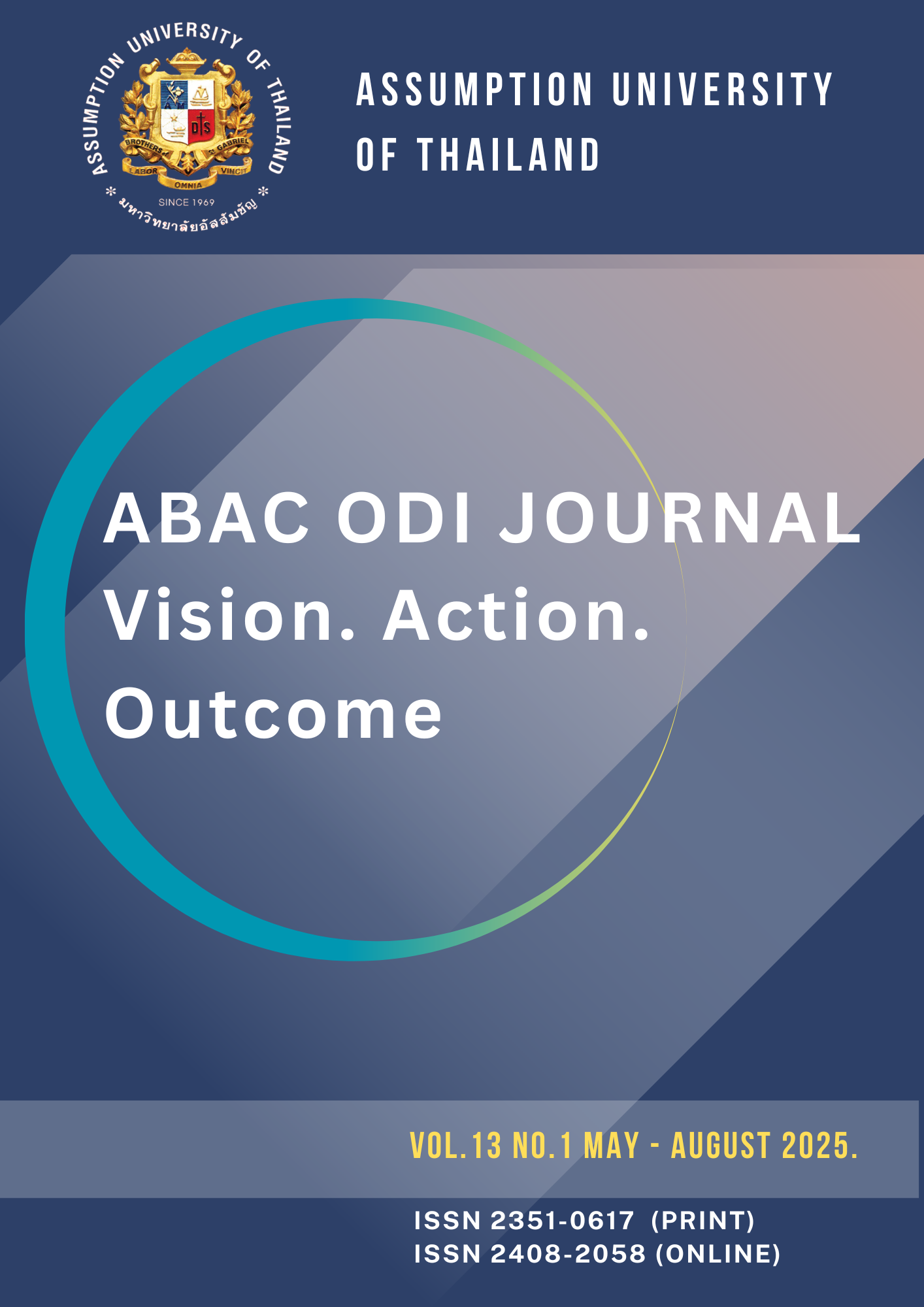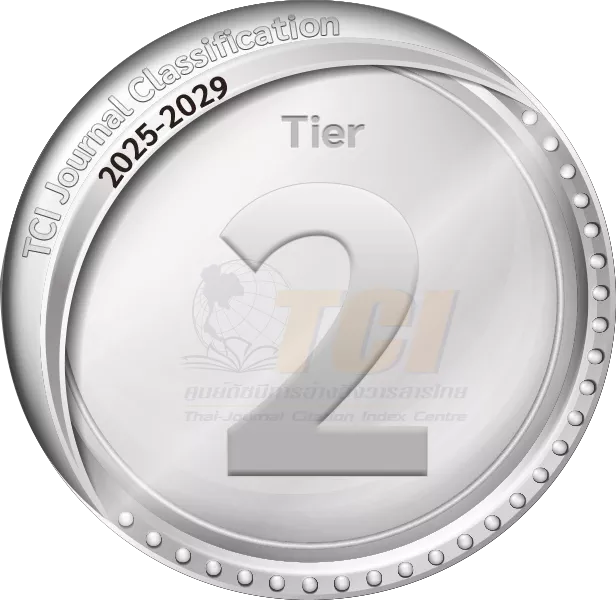Enhancing Employee Performance through Organization Development Interventions: A case of Top J Intellectual Property Agency Company in Qingdao, China
DOI:
https://doi.org/10.14456/abacodijournal.2025.20Keywords:
Employee Performance, Employee Knowledge, Employee Skills, Employee Attitude, Employee MotivationAbstract
This study evaluates the impact of Organization Development Intervention (ODI) on employee performance at Top J Intellectual Property Agency in Qingdao, China, focusing on knowledge, motivation, skills, attitude, and overall performance. The research follows a structured three-phase process: pre-ODI diagnosis of current challenges, ODI implementation of tailored interventions, and post-ODI assessment of outcomes. Data collection utilized Appreciative Inquiry-based interviews and expert-reviewed questionnaires, with analysis through descriptive statistics and paired-sample t-tests.
The ODI activities, including structured training, coaching, and mentoring, aimed to enhance employee competencies. The sample included 66 employees with over six months of service, supplemented by insights from five in-depth interviews. Results demonstrate significant improvements across all areas, particularly in knowledge, motivation, skills, and attitude. These findings underscore the value of targeted ODIs in enhancing employee performance within competitive sectors like intellectual property, providing practical insights for similar industries seeking to foster workforce development and optimize performance.
References
Al-Alwan, M., Bader, D., Al-Qatawneh, M., Alneimat, S., & Al-Hawary, S. (2022). E-HRM and employee flexibility in Islamic banks in Jordan. International Journal of Data and Network Science, 6(3), 703-710. https://doi.org/10.5267/j.ijdns.2022.4.002
Al Shraah, A., Abu-Rumman, A., Al Madi, F., Alhammad, F. A. F., & AlJboor, A. A. (2022). The impact of quality management practices on knowledge management processes: a study of a social security corporation in Jordan. The TQM Journal,34(4), 605-626. https://doi.org/10.1108/tqm-08-2020-0183
Braun, V., & Clarke, V. (2006). Using thematic analysis in psychology. Qualitative Research in Psychology, 3(2), 77-101.https://doi.org/10.1191/1478088706qp063oa
Cherian, J., Gaikar, V., Paul, R., & Pech, R. (2021). Corporate Culture and Its Impact on Employees' Attitude, Performance, Productivity, and Behavior: An Investigative Analysis from Selected Organizations of the United Arab Emirates (UAE).Journal of Open Innovation: Technology, Market, and Complexity, 7(1), 45. https://doi.org/10.3390/joitmc7010045
Forson, J. A., Ofosu-Dwamena, E., Opoku, R. A., & Adjavon, S. E. (2021). Employee motivation and job performance: a study of basic schoolteachers in Ghana. Future Business Journal, 7(1), 30. https://doi.org/10.1186/s43093-021-00077-6
Kalogiannidis, S. (2021). Impact Of Employee Motivation on Organizational Performance.A Scoping Review Paper for Public Sector.Strategic Journal of Business & Change Management, 8(3), 984-996. https://doi.org/10.61426/sjbcm.v8i3.2064
Lee, Y., Tao, W., Li, J.-Y. Q., & Sun, R. (2021). Enhancing employees' knowledge sharing through diversity-oriented leadership and strategic internal communication during the COVID-19 outbreak.Journal of Knowledge Management, 25(6), 1526-1549. https://doi.org/10.1108/jkm-06-2020-0483
Liu, G. (2022). The impact of error management culture on the innovative proactive behavior of the new generation workforce. Journal of Science and Technology Progress & Policy, 41(2), 151-160.
Miao, R., Bozionelos, N., Zhou, W., & Newman, A. (2022). High-performance work systems and key employee attitudes: the roles of psychological capital and an interactional justice climate.Routledge. https://doi.org/10.4324/9781003344544-8
Rivaldo, Y., & Nabella, S. D. (2023). Employee performance: Education, training, experience and work discipline. Calitatea, 24(193), 182-188. http://dx.doi.org/10.47750/QAS/24.193.20
Saniuk, S., Caganova, D., & Saniuk, A. (2023). Knowledge and skills of industrial employees and managerial staff for the industry 4.0 implementation. Mobile Networks and Applications, 28(1), 220-230. https://doi.org/10.1007/s11036-021-01788-4
Straub, L., Hartley, K., Dyakonov, I., Gupta, H., van Vuuren, D., & Kirchherr, J. (2023). Employee skills for circular business model implementation: A taxonomy. Journal of Cleaner Production, 410, 137027. https://doi.org/10.1016/j.jclepro.2023.137027
Wang, C., & Zuo, M. (2020). Aging employees' workplace success: Antecedents, consequences, and implementation strategies. Journal of Shanghai University of Finance and Economics, 1-55.
Wang, C.-F., Lan, Y.-L., Yan, Y.-H., & Chen, C.-C. (2022). The Impact of Health Promotion Hospital Employees on Human Resource Management Policy Satisfaction and Retention.International Journal of Medical Science and Health Research, 6(2), 59-70. https://doi.org/10.51505/ijmshr.2022.6207
Wang, H., Li, Y., & Zhang, X. (2016). The impact of mentoring on employee development and organizational success. Journal of Management Studies, 14(1), 78-94.
Yandi, A., & Havidz, H. B. H. (2022). Employee performance model: Work engagement through job satisfaction and organizational commitment (A study of human resource management literature study). Dinasti International Journal of Management Science,3(3), 547-565. https://myjournal.or.id/index.php/JLSSH
Yang, J., & Long, R. (2006). The effectiveness of mentoring relationships in career development. International Journal of Human Resource Management, 10(4), 233-250.
Zeng, X., & Zhou, L. (2012). Coaching techniques and skill development in employees: A case study approach. Journal of Business Training Studies, 8(2), 101-115.Zhao, P. (2013). Modern apprenticeship: Integrating education and professional development. Vocational Training and Education Research, 9(3), 112-130.
Zulkifli, Z., Purwati, A. A., Renaldo, N., Hamzah, Z., & Hamzah, M. L. (2023). Employee performance of Sharia Bank in Indonesia: The mediation of organizational innovation and knowledge sharing. Cogent Business & Management, 10(3), 2273609. https://doi.org/10.1080/23311975.2023.2273609




